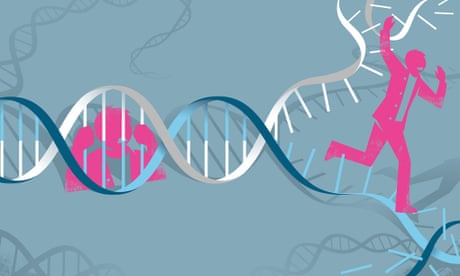
A Brief History of Everyone Who Ever Lived review – popular science at its best
Adam Rutherford’s elegant account of the Human Genome Project brings a note of realism to our dreams of a medical revolution
Sixteen years ago, British researcher Ewan Birney launched an unusual sweepstake. At the time, scientists were completing the Human Genome Project, the international effort to unravel the genetic makeup of human beings. But how many individual human genes would be revealed when the project was completed, Birney wondered? So he asked the world’s top geneticists to each bet a dollar on the outcome.
This might have seemed a rather tardy question, given that the project had already consumed “the best part of a decade, the invention of brand new technologies, unprecedented computing power and $3bn”, as Adam Rutherford notes. Late or not, Birney’s query nevertheless produced a striking answer.

Do your genes determine your entire life?
A total of 460 geneticists – including several Nobel winners – stepped up to make their predictions. Some believed the project would show humans have up to 250,000 genes. After all, we are extraordinarily complex creatures, it was argued. Surely we must have a huge number of genes to control the manufacture of the proteins from which our densely connected neural circuits are made. Other researchers stuck at around 150,000 while most plumped for a figure above 70,000. Birney chose 48,000. The lowest guess, by US geneticist Lee Rowen, was 25,947.
Then, in 2003, the Human Genome Project revealed the true figure. We have about 20,000 genes. “The best experts in the world were all mistaken,” writes Rutherford. “And they were not just a little bit out.” Our much-vaunted understanding of how DNA rules our bodies, minds and lives, gleaned in the latter half of the 20th century, was shown to rest on rather shaky intellectual ground.
Humans turn out to have fewer genes than a roundworm. Or a banana. Or a grain of rice. Yet scientists had no inkling our complement of genes was so meagre. As Rutherford notes: “The greatest achievement of the Human Genome Project was working out exactly how little we knew.”
It is a neat phrase and typical of this elegant, informed account of the lessons we are still learning from the project. This is no bombastic view of a world transformed by modern genetics or a health service revolutionised by gene-based therapies. More than anything, this is a book that highlights the limits of what genes can tell about us or do for us. Yes, they have helped us understand the causes of diseases. “But the number of diseases that have been eradicated as a result of our knowing our genome? Zero,” states Rutherford. “And the number of diseases that have been cured as a result of gene therapy? Zero.”
Biology researcher Ewan Birney challenged the world’s top geneticists to predict the outcome of the Human Genome Project. Photograph: Antonio Olmos
Such advances will doubtless occur in the long term. However, it is Rutherford’s aim to bring some realism to the subject without losing a sense of wonder about the new biological visions being opened up. We have discovered that modern humans once interbred, albeit briefly, with our Neanderthal predecessors; conclusively pinpointed the corpse of Richard III; and demonstrated that the idea of race is an illusion. Indeed, on this last point, Rutherford is unequivocal. “Genetics has shown that people are different and these differences cluster according to geography and culture but never in a way that aligns with the traditional concepts of human races.”
Nor is Rutherford happy with some of those who seek to commercialise modern genomics, and in particular derides ancestry companies that have claimed their DNA tests reveal the identity of Jack the Ripper; that Prince William harbours Indian blood; and that it is possible to trace living descendants of the Queen of Sheba. This is “PR dressed up as research”, we are told.
For Rutherford, modern genetics has far less to say about us as individuals than we have been led to believe. On the other hand, he is confident it sheds a great deal of light on us as a species. Demonstrating these divergent concepts is not easy. Happily, Rutherford is up to the task. He has produced a polished, thoroughly entertaining history of Homo sapiens and its DNA in a manner that displays popular science writing at its best.
No comments:
Post a Comment